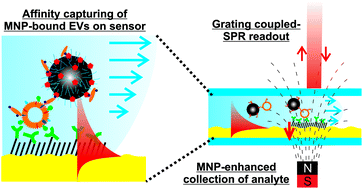Magnetic nanoparticle-enhanced surface plasmon resonance biosensor for extracellular vesicle analysis
Abstract
The sensitive analysis of small lipid extracellular vesicles (EVs) by using a grating-coupled surface plasmon resonance (GC-SPR) biosensor has been reported. In order to enable the analysis of trace amounts of EVs present in complex liquid samples, the target analyte is pre-concentrated on the sensor surface by using magnetic nanoparticles and its affinity binding is probed by wavelength interrogation of SPR. The GC-SPR has been demonstrated to allow for the implementation of efficient pulling of EVs to the sensor surface by using magnetic nanoparticles and an external magnetic field gradient applied through the sensor chip. This approach overcomes slow diffusion-limited mass transfer and greatly enhances the measured sensor response. The specific detection of different EV populations secreted from mesenchymal stem cells is achieved with a SPR sensor chip modified with antibodies against the surface marker CD81 and magnetic nanoparticles binding the vesicles via annexin V and cholera toxin B chain.



 Please wait while we load your content...
Please wait while we load your content...